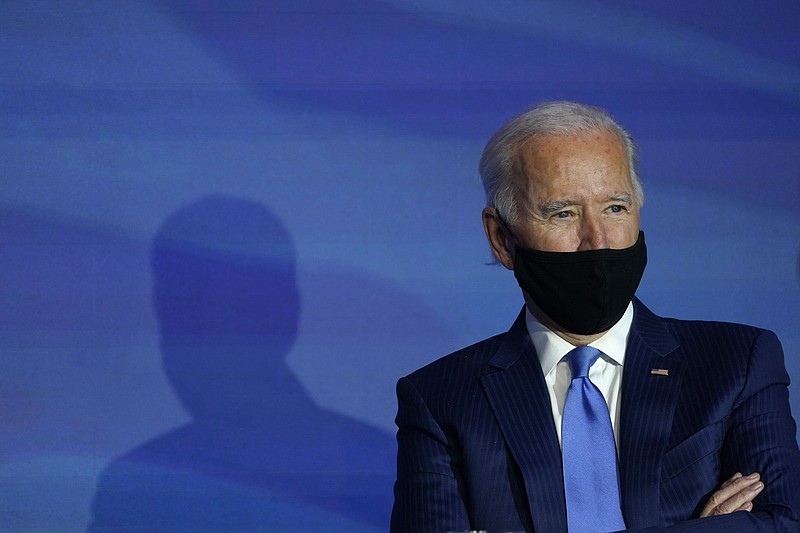Faint fiscal memories
Right on cue, Republicans who forgot about deficits throughout the Trump administration now are wringing their hands and pretending to care about them once more now that President Joe Biden is pushing a $1.9 trillion COVID relief plan.
Several GOP senators used the confirmation hearing last week for Treasury Secretary-nominee Janet Yellen to complain and lay the groundwork to block the relief.
"The one thing that concerns me that nobody seems to be talking about anymore is the massive amount of debt that we continue to rack up as a nation," said Sen. John Thune, R-South Dakota. "For me, that is a huge warning sign on the horizon, the fact that we have an ever-growing deficit, an ever-growing debt and no apparent interest in taking the steps that are necessary to address it."
Sen. Rob Portman, R-Ohio, then picked up the ball and declared that U.S. deficit levels are "frightening," and Sen. James Lankford, R-Oklahoma, added that waiting for interest rates to rise to indicate that debts are unsustainable would be "too late."
These guys failed to mention that each of them in 2017 voted for tax cuts that added nearly $2 trillion to deficits. Nor did they talk about how the Republican-controlled Senate passed and then-President Trump signed additional spending bills that added another $2 trillion to deficits.
The Republicans even had the cheek to implore Yellen to maintain the 2017 tax cuts.
She took it in stride and charmingly schooled them.
"Senator, I agree with you that it's essential that we put the federal budget on a path that is sustainable," she told Thune. "But the most important thing, in my view, that we can do today to put us on a path of fiscal sustainability is to defeat the pandemic, to provide relief to American people and then to make long-term investments that will help the economy grow and benefit future generations."
Failing to do enough to "address the pandemic and the economic damage that it is causing would likely leave us in a worse place fiscally," she said. For now, "the smartest thing we can do is act big."
If the GOP has really remembered their fiscal consciences - a big if - they know she's right.
More hearings and hires to come
Every four or eight years, new presidents are required to fill roughly 4,000 politically-appointed positions in the executive branch, including more than 1,250 that require Senate confirmation.
The Washington Post and the Partnership for Public Service, as they did with the Trump administration, are tracking Biden nominees for roughly 800 of those 1,250 positions, including Cabinet secretaries, chief financial officers, general counsels, ambassadors and other critical leadership positions.
As of Friday afternoon, the Biden tally looked like this: The president had thus far picked 51 nominees to fill key roles in his administration, 15 nominees have been announced, 34 are being considered by the Senate, and two, Director of National Intelligence Avril Haines and Secretary of Defense Lloyd J Austin III, have been confirmed. Another 592 positions have no nominee yet, and there are 111 appointees so far who are serving in termed positions or who were held over from previous administrations.
It works like this: the president must formally nominate candidates to be confirmed by the Senate as part of its "advice and consent" responsibilities under the Constitution. From announcement to confirmation, each nominee must pass through several steps, including a formal nomination, a referral to at least one Senate committee, a committee hearing and an up-or-down vote on the Senate floor.
Transportation Secretary-nominee Pete Buttigieg on Thursday charmed senators in a bipartisan hearing chaired by the Commerce Committee's Sen. Roger Wicker, a Republican from Mississippi, who holds the gavel while both parties work out a power-sharing agreement in the 50-50 split Senate.
Wicker said Buttigieg was almost certain to win confirmation: "Mayor Buttigieg has impressive credentials that demonstrate his intellect and commitment to serving our nation," the senator said.
Austin's daunting task
On Thursday evening, Congress granted a waiver to let retired four-star Army general Lloyd Austin serve as defense secretary, clearing the way for his Friday confirmation as the first Black American to hold that job. The waiver was required because he retired in 2016 and U.S. law requires (unless it is waived), for a defense secretary to wait seven years after active-duty service before taking the job. The idea is to give the nominee ample time to settle into civilian life - not military life. But it seems Austin's primary and most important task will have little to do with civilian life.
Austin told lawmakers Wednesday he will rid the military of "racists and extremists."
At this moment in history, that's no small pledge. Nearly one in five of the 140 extremists and rioters known to be facing charges in the aftermath of the Capitol attack Jan. 6 has been identified by NPR as acting service members or veterans. That's a frightening figure considering that only about 7% of all American adults are military veterans, according to the U.S. Census Bureau. What's more, the National Guard announced last week that it had sent 12 troops home from inauguration security duty as of Tuesday, including two with possible links to right-wing militias.
Godspeed on your task, Secretary Austin.
